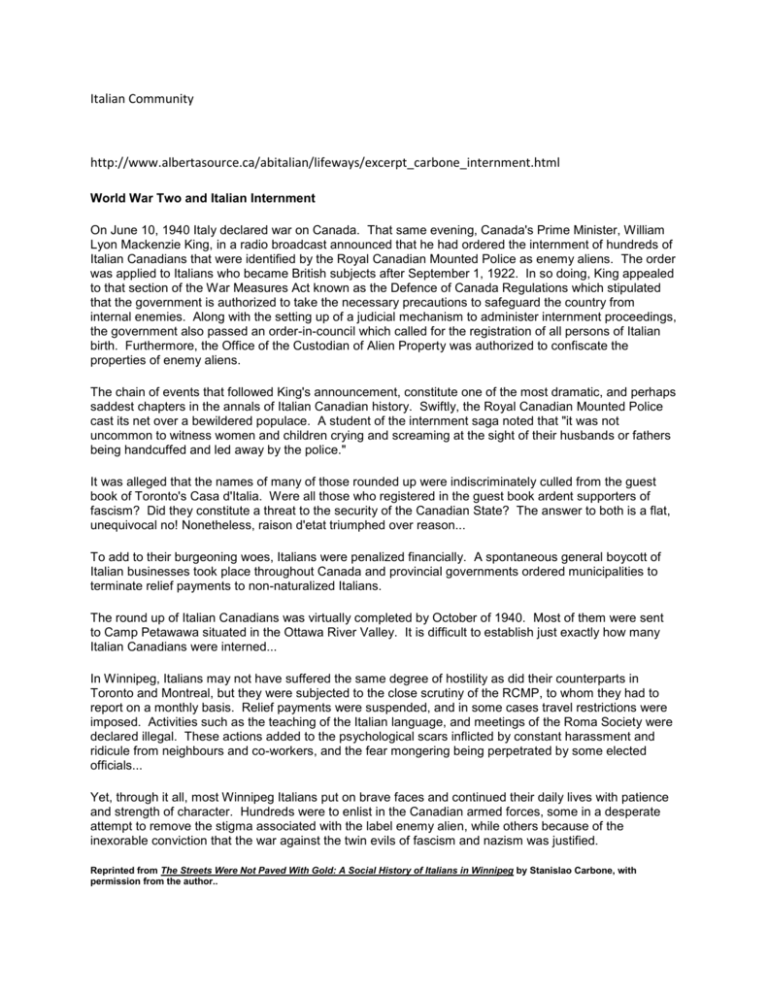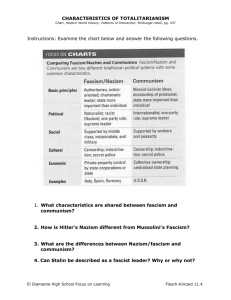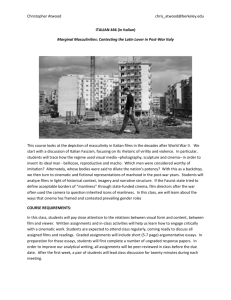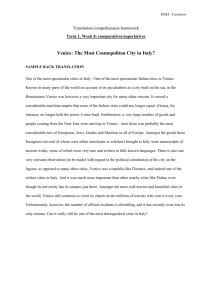Italian Community - Holy Family Catholic Regional Division No
advertisement

Italian Community http://www.albertasource.ca/abitalian/lifeways/excerpt_carbone_internment.html World War Two and Italian Internment On June 10, 1940 Italy declared war on Canada. That same evening, Canada's Prime Minister, William Lyon Mackenzie King, in a radio broadcast announced that he had ordered the internment of hundreds of Italian Canadians that were identified by the Royal Canadian Mounted Police as enemy aliens. The order was applied to Italians who became British subjects after September 1, 1922. In so doing, King appealed to that section of the War Measures Act known as the Defence of Canada Regulations which stipulated that the government is authorized to take the necessary precautions to safeguard the country from internal enemies. Along with the setting up of a judicial mechanism to administer internment proceedings, the government also passed an order-in-council which called for the registration of all persons of Italian birth. Furthermore, the Office of the Custodian of Alien Property was authorized to confiscate the properties of enemy aliens. The chain of events that followed King's announcement, constitute one of the most dramatic, and perhaps saddest chapters in the annals of Italian Canadian history. Swiftly, the Royal Canadian Mounted Police cast its net over a bewildered populace. A student of the internment saga noted that "it was not uncommon to witness women and children crying and screaming at the sight of their husbands or fathers being handcuffed and led away by the police." It was alleged that the names of many of those rounded up were indiscriminately culled from the guest book of Toronto's Casa d'Italia. Were all those who registered in the guest book ardent supporters of fascism? Did they constitute a threat to the security of the Canadian State? The answer to both is a flat, unequivocal no! Nonetheless, raison d'etat triumphed over reason... To add to their burgeoning woes, Italians were penalized financially. A spontaneous general boycott of Italian businesses took place throughout Canada and provincial governments ordered municipalities to terminate relief payments to non-naturalized Italians. The round up of Italian Canadians was virtually completed by October of 1940. Most of them were sent to Camp Petawawa situated in the Ottawa River Valley. It is difficult to establish just exactly how many Italian Canadians were interned... In Winnipeg, Italians may not have suffered the same degree of hostility as did their counterparts in Toronto and Montreal, but they were subjected to the close scrutiny of the RCMP, to whom they had to report on a monthly basis. Relief payments were suspended, and in some cases travel restrictions were imposed. Activities such as the teaching of the Italian language, and meetings of the Roma Society were declared illegal. These actions added to the psychological scars inflicted by constant harassment and ridicule from neighbours and co-workers, and the fear mongering being perpetrated by some elected officials... Yet, through it all, most Winnipeg Italians put on brave faces and continued their daily lives with patience and strength of character. Hundreds were to enlist in the Canadian armed forces, some in a desperate attempt to remove the stigma associated with the label enemy alien, while others because of the inexorable conviction that the war against the twin evils of fascism and nazism was justified. Reprinted from The Streets Were Not Paved With Gold: A Social History of Italians in Winnipeg by Stanislao Carbone, with permission from the author.. Fascism The word Fascism has a dual origin. It comes in part from the word fasces, a bundle of rods round an axe carried by the magistrates in ancient Rome as a symbol of power and authority. It comes also from the Italian word, fascio, meaning band or group. The basic concept of Fascism, as elaborated by Mussolini, was that the State was absolute before which individuals and groups were all relative. Mussolini proclaimed, "Everything within the state, nothing against the state, nothing outside the state." The masses should only "believe, obey and fight." For a history of Fascism in Italy, there are many excellent historical accounts. What is important in this period, with respect to Alberta's Italian community, is the impact of the rise of Fascism and how it played out as Italy declared war on Canada (June 10, 1940) and Italians, even some born in the country, became enemy aliens. The issue had arisen briefly in the First World War but Italy had sided with the Allies and that ended the discussion. However, it was demonstrated how the Canadian government would react to "enemy aliens" or suspected enemy aliens on our soil-Ukrainians were interned. As has been noted by many historians, immigrants, whenever possible, retained very close ties with the homeland. Italians in Canada, even those who were second and third generation were aware of the rise to power of Mussolini. The influence of the Fascist government was felt through the consular agents, vice consuls or honorary consuls who were assigned to Italian communities. It was felt, as well, through the priests who were sent by their order from Italy to serve immigrants. It is interesting that, while Edmonton and Calgary, did not have an Italian church at the time, the community of Venice did. In 1924, they began to build Il Redentore Church [Holy Redeemer] with the site being contributed by Oliva John and Angelo Biollo, and lumber and labour contributed by the community and prepared in the Biollo sawmill (check out the Mike Biollo and Mary (Biollo) Doyle oral histories) Father Carlo Fabbris came from Italy to be the Pastor and, according to Mrs. Doyle, established the Fascio de Venice. He remained in Venice until 1927 and was succeeded by Father Lawrence Woodhouse. Tony Bonifacio's unpublished history of the Venice settlement, as well as an interview with Rudolph Michetti by Richard Watts, a staff writer with The Edmonton Journal, which appeared in the paper in October, 1984, provide additional details. In 1924, Rudolph Michetti was sent by his Father Guiseppe to study steam engineering at the Alberta Institute of Technology. Mr. Bonifacio mentions Mr. Michetti boarded with an Italian family in Calgary and got to know Antonio Rebaudengo, who founded the Fascist Party in Calgary. Knowing of the Venice settlement from Rudolph Michetti, Rebaudengo went to Venice in November, 1925, to found the Fascio de Venice with Rudolph Michetti, Efisio Manca and Benedetto Coli. Mr. Bonifacio states that all the Italians in the community got their memberships and were proud of this and Mr. Rebaudengo returned to Calgary. It is also mentioned that the party flag was blessed. Mr. Bonifacio asserts that the Fascio was a social club with members paying annual fees and getting together two or three times a year for picnics. He states: "Of course, they idolized Mussolini, and they hoped that he would improve the way of life in Italy for the relatives, and friends that they had left behind years gone by." He estimates the membership of the Fascio at about 40. The community already had the Duca d'Abruzzi Society, which according to an Edmonton Bulletin article dated January 5, 1917, had the following purpose: The Society, whose "main object is the colonizing of Italians in the forming districts of Venice and the neighborhood, extends free guidance to desirable homesteads to newcomers and helps them otherwise. It is extending its scope by furnishing its members with free medical aid and pecuniary assistance in case of sickness. The presidents are F.A. Billas [Biollo] and A. Piemonte and the directors are Messers. A. Guerra, L. Rizzoli, E. Manca, T. Piemonte and P. Bonifacio. According to Antonella Fanella, there was an active Fascist party in Calgary from the 1920s, which seems to have existed outside of the Giovanni Caboto Loggia. She confirms what Mr. Bonifacio notes that it was a social club. Fanella writes: At a convention in Calgary in 1926, the Fascisti outlined their objectives: among other goals, they sought to improve the well-being of Italian immigrants in Canada and to promote a better understanding of ItaloCanadian culture. Claims that it was a subversive organization are doubtful since Italians are apolitical by nature. In fact, at the convention members pledged to "love, serve, obey and exalt the Dominion of Canada and to teach the obedience to and respect for its constitutions and laws." 1 While I would agree with much of what she says, her assertion that Italians are "apolitical" is unlikely. The range of political nuances in Italy is evidence that Italians take their politics seriously and want a very close "fit" with their own views of not only political issues but also party politics. With respect to information derived from oral histories, error does arise, frequently the result of old age and memory being fallible. Mr. Butti, in an oral history interview conducted in August/September, 1983, talked about the Fascists in Edmonton. He mentions Pietro Colbertaldo, a watchmaker on Jasper Avenue, who sent to Italy for a watchmaker and Vittorio Losa came out. According to Mr. Butti, Mr. Colbertaldo wanted to start a consular agency and went to Italy for training, likely in 1937; and he put Mr. Losa in charge of watch repair. In fact, Mr. Losa had been in Canada a long time, as his own oral history conducted at the same time mentions. He came to Edmonton in 1920 where he worked in a jewelry store and ultimately became the owner. According to his oral history interview, he was the Italian Honorary Consul in Edmonton in the 1920s and the 1930s. Mr. Colbertaldo had a Venice connection, according to Tony Bonifacio. He had arranged to have his sister and brother-in-law, Giovanni and Teresa Favero, to come to the region. The couple settled on a homestead in what is now Wandering River and he returned to Italy in 1948. It was Colbertaldo, Losa and Rebaudengo in Calgary, who were the consular agents and, thus, had direct connections with Italy and could serve as spokesperson's for the Italian government in Canada. On his return from Italy, Colbertaldo became Vice-Consul in Winnipeg for western Canada and was one of the people arrested in 1940 according to Stanislao Carbone, Winnipeg Italian community historian. When Mr. Losa was interviewed by Giancarlo Grelli and Sabatino Roncucci, he was at pains to say how much he loved Canada and that he had not been to Italy for many years. As an old man, he was clearly sensitive to his association with Fascism and the "un-Canadian" light in which this cast him. This had all been forgotten by the last decades of the 20th century and the City of Edmonton named a district after him, Terra Losa. With the declaration of war by Italy on Canada, Mr. Butti mentions that he was investigated because he was President of the Italian Society in Edmonton. He had assumed that, because he was under 21 that he had become a Canadian citizen when his Father did in the early 1920s. The RCMP informed him that this was not so and he was told that he could not leave town. He pointed out that his work as an electrician required him to travel around the Province and, eventually, they turned a blind eye and let him get on with his business. He talks about individuals wearing black shirts and the Fascist rosette on their lapels in Edmonton. In Venice, this was felt even more strongly. Mr. Bonifacio notes: With Italy becoming allied with Germany the ghost of the Fascist in Venice is resurrected, and opens up a can of worms. Someone reported to the R.C.M.P. in Lac La Biche that the party had existed in Venice, and that led to an investigation by the police. Although the party had ceased to exist for many years, the police located records that Mr. Coli in Hylo still had and some of the names led to the arrest of O.J. Biollo first. He was taken to Calgary and sent to a concentration camp in Kananaskis. A short time later Rudolph Michetti, Augusto Marini, Efisio Manca, and Joe Michetti were arrested and taken to Edmonton, and after a hearing the three were sent home only Rudolph was sent to Kananaskis to keep O.J. Biollo company. A short time later they were transferred to a camp in Petawawa Ontario. At this camp they were among German and Italian prisoners of war. Mr. Biollo suffered from severe bronchitis all his life so he was assigned to light duty in the compound, but Rudolph along with other prisoners were taken daily with trucks escorted by armed guards to the forest to cut down tress that were to be used as mine props.1 Gisella Biollo in her profile of Guiseppe and Filomena Michetti, Rudolph Michetti's parents, in the HyloVenice history book provides more details. She writes: November 25, 1925-Pietro Colbertaldo [from Edmonton], Antonio Rebaudengo and Gafolla from the Fascist headquarters in Calgary, came to Venice and the fascio de Venice was officially organized. It was like a club where the members met once in a while as a get-together with never any harm done. Although the organization was allowed in peace time, during the war it was considered a threat to the Allies. October 10, 1940-O.J. Biollo, a member of the Fascist Party, was arrested by R.C.M.P. Corporal Fielding and sent to concentration camp without trial to Kananaskis, near Calgry, for a while and then to Petawawa, Ontario, where he stayed eleven months. December 13, 1940-Rudolf Michetti, President of the Fascio of Venice, his father Joe Michetti, who was taken from a sick bed after an operation, Efisio Manca and A. Marini, who were also members, were arrested by Corporal Fielding and sent to Edmonton, where they had a trial. By now, the government had changed the laws for the R.C.M.P. where they could not send a man to concentration camp without a trial. All came back except Rudolf Michetti, who is sent to Kananaskis and then to Petawawa, Ontario, where he stayed ten months, leaving a pregnant wife and five children with no support, in poverty. 2 Footnote: Gisella Biollo, Hylo-Venice: Harvest of Memories (Hylo: Rose Country Communications, 2000). The shadow of Fascism also fell on other Italian Canadians in Alberta. Antonella Fanella mentions that, in Calgary, Tony Valerio's application to become a pilot an navigator in the Royal Canadian Air Force was rejected because of his status as the son of an immigrant. She quotes Audrey Forzani (nee De Negri), Hudson's Bay Company employee as follows: War breaks out, Jean Santopinto, Mary Bussi, Dora Buccini and me were pulled into the office of Mr. Trimble, he was the superintendent of The Bay. No he says, 'War's been declared and Mussolini's gone with Hitler.' We were all wondering what he's talking about because we were all born in Calgary, and he says, 'You know, girls, if you keep your mouths shut and don't give your opinion about anything, we will keep you on. But the minute you cause a little bit of trouble, or if there's a ripple around that you say something derogatory against the war, we will have to let you go.' [We wondered] What's he talking about? For Pete's sake! We were warned not to say anything or give our opinion. I don't remember having an opinion. War was over there, we felt sorry for the people, but we never discussed the war. 1 She notes that Antonio Rebaudengo was interned and spent three years in Kananaskis, Camp Petawawa and Gagetown Camps, only being released in 1943. His son, Mario, served in the Canadian army and she quotes him as follows: "We were called 'dago,' 'Mussolini," 'Fascist.' We tried to ignore it. We were the minority. We were the aliens. War was not on our side." Toni Ross writes in Oh! The Coal Branch that the mines were militant about enforcing enemy alien provisions. She notes: A meeting of residents in this district met at Sterco on Sunday afternoon, June 2nd, 1940 when 55 British subjects were in attendance to discuss the employment of enemy aliens to fill the positions left open by men joining the C.A.S.F., and it was moved that a petition be sent to the management as follows: 1. No enemy aliens or any naturalized since 1939 be employed for the duration of the war; 2. Preference be given to British subjects as foremen; 3. Positions vacated by men enlisting in the C.A.S.F. be filled by British subjects. The motion was carried unanimously." Methods of combating fifth column activities were discussed and it was decided to report all anti-allied activities. 2 As with other communities in Alberta with a significant population of Italian immigrants (Venice, Edmonton, Calgary, Lethbridge and Drumheller), this divided the community into "them" and "us" and reinforced the position of power of immigrants from Great Britain. For many Italians who had emigrated near the turn of the century, that their loyalty should be questioned was hurtful and that their livelihood should be at stake was patently unfair. Ross goes on to note that local places of business were not as militant and, of course, Italians owned key businesses, for example D. Giovinazzo owned The Palm Café and Confectionery as well as the Luscar Meat Market. Many young men of Italian descent did enlist and served in the war effort as is recognized, for example, in the Honour Roll of enlisted men in the Canmore oral history in the Rockies, Nordegg and Coal Branch Region Where there Fascists in Alberta or not? Was their arrest and internment legitimate? Based on memories of the elderly people who lived the experience, the majority of Fascist party members probably only saw it as an Italian society that connected them with their homeland. A few, the honorary consuls Rebaudengo, Colbertaldo and Victor Losa, as well as Father Fabris probably were committed to the Italian government and its agenda. This could be said for many, including businessmen in the US and Canada who saw Mussolini making Italy into a modern nation. It was the declaration of war that changed all of that. Rudolph Michetti, when interviewed by Richard Watts in 1984, suggested that there were some sinister motives. Watts notes that Mr. Michetti had not been embittered by the experience and quotes him as follows: "They were fascists; they wanted Mussolini to come and run the country. . . there was one guy, he got me into fascism when I was only 17 and then smartened up, but I told him he should give it up or he would never get out of the camp." He looked at me and said, "Look 'Dolpho, the time is coming and when it does I'm not going to let anyone else have the privilege; I'm going to put you up against a wall and shoot you." Michetti starts laughing. "They said first they were going to kill everything English from a mouse up, but then they said an English mouse was too big to be left alive and they would start killing from English worms and go up." 1 Was this black internment camp humour or did it have some reality? Who knows, in the early stages of the war, the outcome was uncertain. For further information of Italian community involvement in Fascism in other parts of Canada, please see the Canadian Overview and checkout the entry on Internment. Related Links Book Excerpt: Antonella Fanella discusses the impact of the rise of Mussolini in Italy on Italians in Calgary. http://www.library.wisc.edu/libraries/dpf/Fascism/Home.html Italian Life Under Fascism: Selections from the Fry Collection: An external web resource featuring a history of fascism and features on rare fascist literature from the Fry Collection of the University of Wisconsin. http://www.thecorner.org/hist/total/f-italy.htm Fascist Italy: An external website that features a short history of Italy with a focus on the Fascist movement including the rise of Mussolini and the march on Rome.






